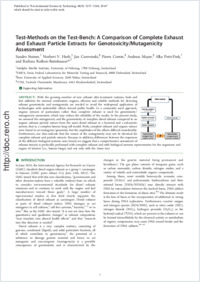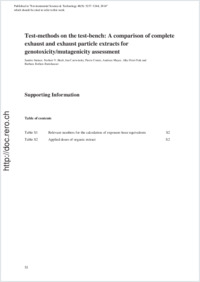Test-methods on the test-bench: a comparison of complete exhaust and exhaust particle extracts for genotoxicity/mutagenicity assessment
- Steiner, Sandro Adolphe Merkle Institute, University of Fribourg, Switzerland
- Heeb, Norbert V. EMPA, Swiss Federal Laboratories for Materials Testing and Research, 8600 Dubendorf, Switzerland
- Czerwinski, Jan Bern University of Applied Sciences, 2560 Nidau, Switzerland
- Comte, Pierre Bern University of Applied Sciences, 2560 Nidau, Switzerland
- Mayer, Andreas TTM, Technik Thermische Maschinen, 5443 Niederrohrdorf, Switzerland
- Petri-Fink, Alke Adolphe Merkle Institute, University of Fribourg, Switzerland
- Rothen-Rutishauser, Barbara Adolphe Merkle Institute, University of Fribourg, Switzerland
-
06.05.2014
Published in:
- Environmental Science & Technology. - 2014, vol. 48, no. 9, p. 5237–5244
English
With the growing number of new exhaust after-treatment systems, fuels and fuel additives for internal combustion engines, efficient and reliable methods for detecting exhaust genotoxicity and mutagenicity are needed to avoid the widespread application of technologies with undesirable effects toward public health. In a commonly used approach, organic extracts of particulates rather than complete exhaust is used for genotoxicity/mutagenicity assessment, which may reduce the reliability of the results. In the present study, we assessed the mutagenicity and the genotoxicity of complete diesel exhaust compared to an organic exhaust particle extract from the same diesel exhaust in a bacterial and a eukaryotic system, that is, a complex human lung cell model. Both, complete exhaust and organic extract were found to act mutagenic/genotoxic, but the amplitudes of the effects differed considerably. Furthermore, our data indicate that the nature of the mutagenicity may not be identical for complete exhaust and particle extracts. Because in addition, differences between the responses of the different biological systems were found, we suggest that a comprehensive assessment of exhaust toxicity is preferably performed with complete exhaust and with biological systems representative for the organisms and organs of interest (i.e., human lungs) and not only with the Ames test.
- Faculty
- Faculté des sciences et de médecine
- Department
- Département de Chimie
- Language
-
- English
- Classification
- Chemistry
- License
-
License undefined
- Identifiers
-
- RERO DOC 210021
- DOI 10.1021/es4056033
- Persistent URL
- https://folia.unifr.ch/unifr/documents/303503
Other files
Statistics
Document views: 127
File downloads:
- pdf: 225
- Supplementary material: 143

